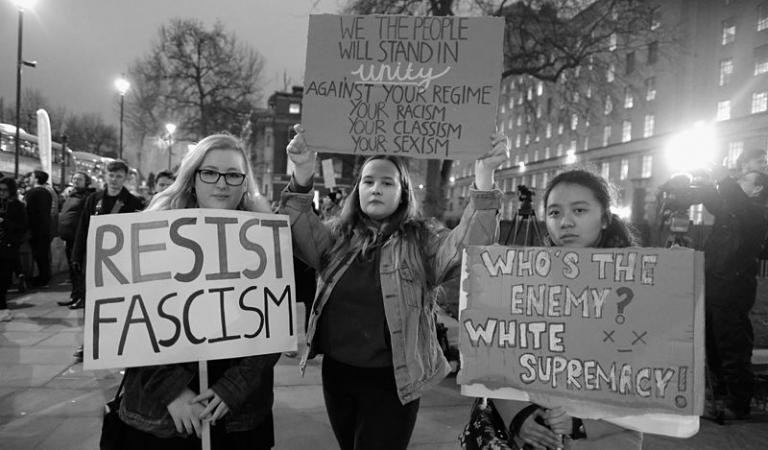Cox Farms in northern Virginia is one of those family farms where you can buy plants, get fresh apple cider, and attend fall festivals. You’ll find baby animals and giant pumpkins there. You can go on hay rides. It’s all very wholesome and family friendly, but Cox Farms has still managed to anger a lot of people. Including Christians.
How?
By posting a sign reading “resist white supremacy.”
As they stated in a Facebook post clarifying their position:
We sincerely believe that fighting injustice and white supremacy is a responsibility that can- and should- unite us all. We struggle to see how anyone other than self-identified white supremacists would take this as a personal attack.
This is pretty straightforward, no nuance about it. And that’s good, because while there are some ethical issues that demand nuance, the evil of white supremacy is not one of them.
In spite of this seeming reasonable approach, however, Cox Farms is still being criticized and boycotted for their position. According to one commenter on their page, “this is not an inclusive message. When you single out a group of people you exclude them. This is a sad message.”
Another commenter objected to being called a racist for expressing a “different point of view.”
Now, one could certainly argue that no human being is reducible to a single label, and no one is ever “just” a racist. It could even be argued that we should refrain from calling people racists when this isn’t likely to induce them to reject racism. But, with these caveats, if your ”different point of view” is to take issue with the statement that we should resist white supremacy, your point of view is a racist one. And if you harbor racist points of view, yes, you are a racist.
Maybe you don’t want to admit you’re a racist? Maybe you don’t like being called one? Okay. But it is a truth universally acknowledged that “I’m not a racist” is invariably followed by a “but” and then by “something super racist.” And, as I have argued before, the first step in eradicating the sin of racism is to confess it and try to do better.
And it’s disingenuous to argue that one is failing in tolerance or inclusivity because one fails to include those who promote an ideology intrinsically dedicated not only to exclusion and intolerance, but exclusion and intolerance backed by violence. As a Jewish catholic, I can get along with many people of different belief systems. I can agree to disagree with Protestants on the nature of the sacraments. I can politely debate atheists about the existence of God. Co-existence is more than just a bumper sticker; it’s a civilized and virtuous goal. But it has its limits. I can’t agree to disagree with a Nazi who thinks I’d be better off in an oven. And a black person can’t be asked to tolerate the opinions of someone who thinks she’s less than human. I will quite happily exclude from my dinner parties those people who are committed to violence against me and my children, and I would rather go to farms where I know those people won’t be lurking in the corn mazes.
This is relevant in academic arguments, also. Freedom of speech and open inquiry are important, and debate – even over difficult matters…in fact, especially over difficult matters – should never be shut down. But there are viewpoints which of necessity militate against the premises of free speech, by asserting that there are some types of persons – the racially different, the queer, the “illegal” – who are not even entitled to exist, let alone express their beliefs. Academic freedom can not flourish in bigoted spaces.
There’s a limit to tolerance. Tolerance is an important humanist virtue, but there are places of darkness where it can not and should not go. “Love your enemies” does not mean “invite a convicted pedophile over to play with your kids.” Nor does it mean “let white supremacists express themselves by lynching black men.” We need radical charity to deal with this level of evil. And the need for charity does not de-legitimize the value of tolerance…but only among those who are willing to make a certain social contract in mutual good will.
It’s interesting, though, to see the point at which some people – people who have promoted intolerance towards LGBTQ persons, Muslims, and immigrants – suddenly decide that “tolerance” is a virtue. If the one thing you’re willing to tolerate is white supremacy, I’m going to take an educated guess that you might just be a white supremacist.
If you’re not a white supremacist, though, at least you know where you can take your family for a pleasant agrarian experience in a racism-free environment, because the racists are all now saying they won’t go there. “Let’s see how this affects your profit margins,” they say – and, what a disturbing thought this is. Because, there have been many times in history when business owners have suffered for taking a stand against white supremacy. Think of store owners who served black persons along with white persons. Think of those in Germany in the 1930s who happily catered to Jews.
If a statement against racism leads to a business losing money, we should be very alarmed about the culture of the United States today.
image credit: https://commons.wikimedia.org/wiki/File:Resist_fascism_-_demonstrators_at_London%27s_anti-Trump_rally._(32602442016).jpg













